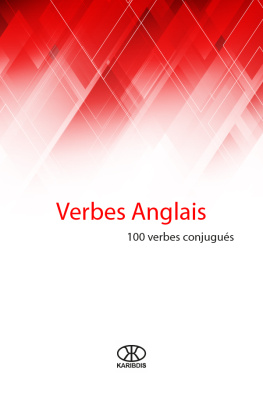Especially written for electronic devices,
German verbs has an introduction to the formation of all verbal tenses in German, as well as 100 essential verbs fully conjugated with their meaning. This book allows the user to search in all the text because it has no images or vanishing or unreadable text.

Editorial Karibdis
German Verbs
100 verbs series - Volume 4 First edition Karibdis 22.03.18 Original title:
German Verbs © Editorial Karibdis, 2018 Cover design: Karina Martínez Ramírez Vector cover image: Creative_hat / Freepik Digital editor: Karibdis First edition: March 2018 All rights are reserved. No part of this book may be used or reproduced in any manner whatsoever without written permission. The unauthorized reproduction of this copyrighted work is illegal. No part of this book may be scanned, uploaded or distributed via the internet or any other means, electronic or print, without the publishers permission.
If you find any misprint, mistake or typo in this book and you want to communicate it to us, please write us at the following email: . We will be very pleased to receive your comments, doubts or other observations in order to make this book better.
GERMAN VERBS
1. Introduction
German language belongs to the Germanic languages like English, Danish and Swedish. The main features of the German language are:
- mood: indicative, subjunctive, conditional, imperative
- tense: present, past, future
- person: first, second, third
- number: singular, plural
- voice: active, passive, reflexive
2. Classification of verbs
German verbs are divided into two groups, according to the formation of the past and the past participle:
- Weak or regular verbs: the vowel of the root does not change
- Strong or irregular verbs: the vowel of the root changes
The present indicative of all verbs is formed with the root of the verb (infinitive without -
en or -
n) plus the endings -
e, -
st, -
t, -
en, -
t, -
en:
KAUFEN (buy) kauf-
e kauf-
st kauf-
t kauf-
en kauf-
t kauf-
en If the root ends in -
d, -
t or a consonant group, a vowel -
e- is added before the endings of the first and second person of singular and the second person of plural:
REDEN (talk) red-
e red-
est red-
et red-
en red-
et red-
en Some strong verbs change the vowel of the root in the second and the third person of singular:
fallen (fall): du fällst, er fällt
schlafen (sleep): du schläfst, er schläft
laufen (run): du läufst, er läuft
geben (give): du gibst, er gibt
helfen (help): du hilfst, er hilft
lesen (read): du liest, er liest
stoßen (find): du stößt, er stößt
4. Compound past
The compound past indicative of all verbs is formed with the auxiliary verb
haben (have) in present indicative plus the past participle of the main verb:
KAUFEN (buy)
habegekauf
thastgekauf
thatgekauf
thabengekauf
thabtgekauf
thabengekauf
t There is a group of intransitive verbs which form the compound tenses with the auxiliary verb
sein (be). Some of these verbs are
biegen (bend),
bleiben (stay),
brechen (break),
fahren (drive),
fallen (fall),
fliegen (fly),
gehen (go),
laufen (walk),
rennen (run),
reisen (travel),
reiten (ride),
scheiden (separate),
schmelzen (melt),
sein (be),
springen (jump),
sterben (die),
treten (step),
verderben (ruin),
wachsen (grow) and
werden (become):
REISEN (travel)
bingereis
tbistgereis
tistgereis
tsindgereis
tseidgereis
tsindgereis
t5. Past
The past indicative of weak verbs is formed with the root of the verb plus the endings -
te, -
test, -
te, -
ten, -
tet, -
ten:
KAUFEN (buy) kauf-
te kauf-
test kauf-
te kauf-
ten kauf-
tet kauf-
ten The past indicative of strong verbs are formed with the root of the irregular verb (see the list of strong verbs) plus the endings -
ø, -
st, -
ø, -
en, -
t, -
en:
SINGEN (sing) sang sang-
st sang sang-
en sang-
t sang-
en6. Pluperfect
The pluperfect indicative of all verbs is formed with the auxiliary verb
haben (have) in the past plus the past participle of the main verb:
KAUFEN (buy)
hattegekauf
thattestgekauf
thattegekauf
thattengekauf
thattetgekauf
thattengekauf
t Some intransitive verbs as
biegen (bend),
bleiben (stay),
brechen (break),
fahren (drive),
fallen (fall),
fliegen (fly),
gehen (go),
laufen (walk),
rennen (run),
reisen (travel),
reiten (ride),
scheiden (separate),
schmelzen (melt),
sein (be),
springen (jump),
sterben (die),
treten (step),
verderben (ruin),
wachsen (grow) and
werden (become) form the pluperfect with the auxiliary verb
sein (be) in the past plus the past participle of the main verb:
REISEN (travel)
wargereis
twarst


















 Editorial Karibdis
Editorial Karibdis